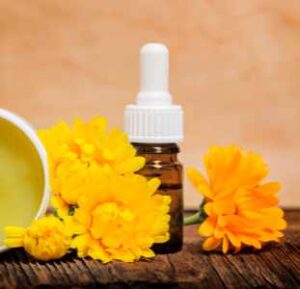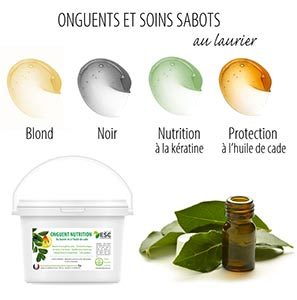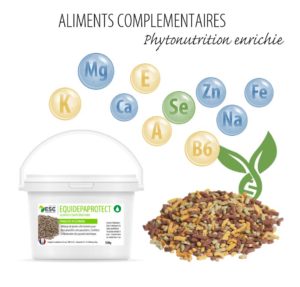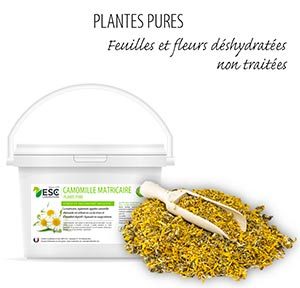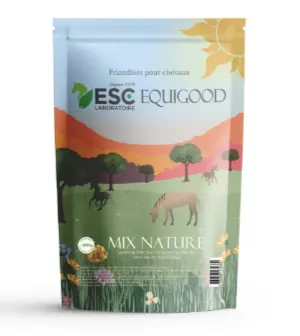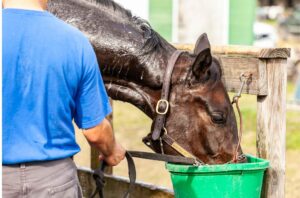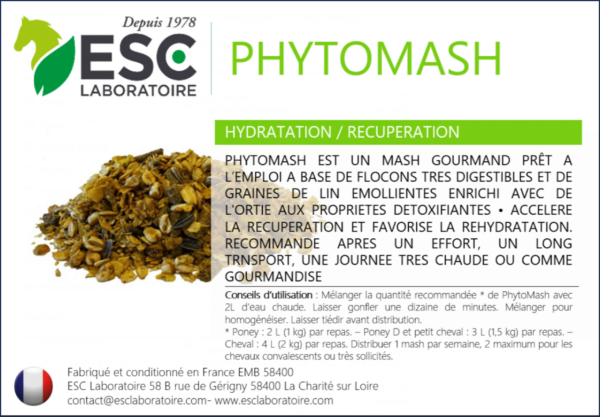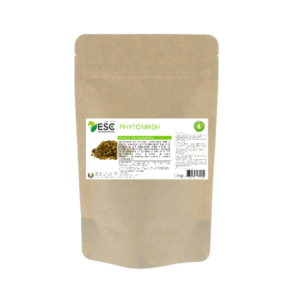Horse nutrition is a very complex subject, depending on the needs of each animal. Among the different foods used for horses, mash is still a little known option, but traditionally used since the late 19th century in racing stables. This meal cooked in a large volume of water offers many benefits for the health of horses, provided you do not overdo it.
If you're considering giving mash to a horse, here's all you need to know about its benefits and how to use it properly.
What is horse mash?
The mash for horses refers to food that is soaked before being given to the horse. The mash (or pureed in French) are often made from cereals (oats, barley and/or corn), possibly supplemented by high-fibre wheat sound, and Flaxseed rich in mucilages and other ingredients according to recipes.
Historically, the mash of sound intended for horses was occasionally given after more difficult work, like a hunting day, to moisturize the horses and facilitate recovery. In England, from which they came, they were distributed especially in winter to avoid overheating horses. Wheat and flaxseeds, by their slightly laxative properties, were used to regulate intestinal transit.
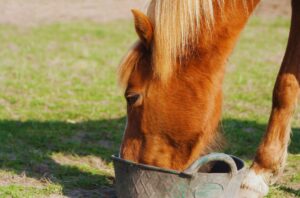 These preparations have for a time lost in popularity, as their alleged laxative effects are only very little supported by scientific studies. But also becauseA sudden change in diet is not always desirable for horses because they can weaken their intestinal flora.
These preparations have for a time lost in popularity, as their alleged laxative effects are only very little supported by scientific studies. But also becauseA sudden change in diet is not always desirable for horses because they can weaken their intestinal flora.
And probably even less after a period of intense work, during which the first objective should be to contribute to the restoration of the horse's energy reserves.
The horse mash have also an inverted calcium/phosphorus ratio and can therefore unbalance the nutritional balance of the animal (which can nevertheless be compensated by providing other sources of calcium). However, as there are better alternatives available, the sound has fallen into disgrace.
There is now on the market a wide range of foods in the form of mash for horses. These new income are generally based on highly digestible fibres such as alfalfa, flaxseed, sugar beet or grass.
Why give his horse mash?
On the assumption that we are going to talk here about new mash recipes and not from its traditional version to the sound, here the good reasons to feed his horse in Mash.
1. Rebuilding energy reserves
Particularly active horses, producing an efstrong physical sustained and prolonged, will draw from their energy stocks (food carbohydrates). But this energy reserve will determine the length of time the horse can support this intense effort, and the subsequent recovery.
Mash is an interesting ingredient to allow your horse to restore its reserves of muscle glycogens, because of its carbohydrate content (and more specifically starch) brought by cereals. It will therefore be necessary to adjust the amount given to your horse according to its activity and needs.
2. Rehydrate the horse
The sound of wheat and the cereal flakes contained in the mash are also interesting forrehydrate the horse after intense effort and therefore a loss of water by sweating. The latter have the peculiarity of throating water, which allows the horse to ingest hydrated foods.
But the rehydrating properties of mash are also beneficial during the winter months, When horses spend long periods eating preserved fodder such as hay, which has a much lower moisture content than fresh grass.
Horses are also often reluctant to drink when it is colder. According to some research, they tend to drink up to 14% less water During the winter months, where it is important to help them increase their consumption of water via food.
Travel and competitions can also increase the risk of dehydration, which can lead to compromise both performance and horse recovery. Not to mention that some horses may be drinking when they are not in a familiar environment.
3. Facilitating transit
As we have seen, this statement is not true for all types of mash. This depends not only on the raw materials used (and their natural fibre richness), but also the quantity distributed. Priority therefore mash rich in vegetable fibers which will promote transit.
Cereal flake preparations will make starch more accessible to enzyme digestion. They will be better digested compared to whole grains and uncooked grains.
Finally, the mucilages brought by flax seeds will act as an intestinal dressing and are beneficial in case of a sensitive stomach or intestine.
4. Facilitating the recovery of a sick horse
The mash can be interesting for reintroduction of concentrates after recovery (e.g. post-operative) where only forage was fed.
It is also beneficial for horses with dental problems and who have difficulty chewing, as well as those with limited appetite, especially in weakened or elderly horses.
Finally, it can be beneficial for horses allergic to dust.
What precautions before giving his horse mash?
Mash has many benefits, provided certain conditions are met. First, mash must always be used in addition to fodder. Very concentrated in starch, this preparation should be given in a reasoned and spaced manner. The mash must also be the only concentrated food integrated into the horse's diet.
The mash must not be used more than once a week for active horses and more than twice a week for highly sought after horses (such as racing horses).
In the event of a horse's recovery (and to help take a normal diet), its duration of distribution must be restricted to the period of recovery and stop when the horse is again healthy.
Attention also horses susceptible to pathologies caused by excess starch such as forbure. This also applies to those who suffer from recurrent myositis.
Finally, and for health reasons, it is best to give the maximum mash within 24 hours Next its preparation.
Verdict: Should we give his horses mash?
Remember that the mash is an interesting alternative to a meal to give to your horse to enable it to rebuild its energy and water reserves, in addition to its benefits on intestinal transit. It is essential, however, to give it only once a week and to control the quantity distributed which must be adapted to each horse and in particular to its activity.
Our laboratory offers you Phytomash, a gourmet mash Loan for use with very digestible flakes and emollient flax seeds enriched with the absence of detoxifying properties. Our mash will support recovery and promote rehydration of your horse.
-
Best Seller2 opinions


